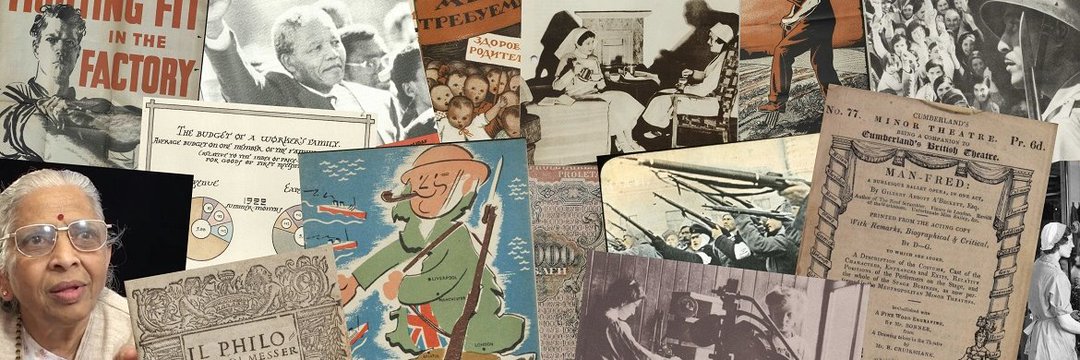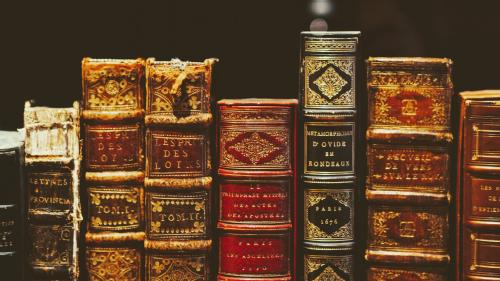History Head Start

Welcome to the Warwick History department’s ‘History Head Start’! Get a head start on studying History at University with this course designed to introduce you to the skills of academic reading and primary source analysis. The course explores various historical topics by looking at an academic journal article or primary sources from the Modern Records Centre’s vast collections. History as a subject helps you to deepen your understanding of the past and encourages you to think critically about the world that we live in. The course is split into 12 'options', so you can either work through all of these or pick whichever interest you the most!
Once historians have completed a piece of research (for example, having searched through archives for relevant information, interviewed people, watched/viewed/listened to relevant media… the list is endless!), they will write up this research as a book or a shorter article to submit to a history journal. History journals present new scholarship on a historical subject and are often focused on narrower subfields of history – examining different topics, regions, or time periods. Panels of historians will review the work that has been submitted to the journal, making some suggestions about how it might be improved. Once the journal has accepted the article, it is then published to be read and discussed by the wider historical community.
Our aim here is to highlight some of the articles that researchers at the University of Warwick have selected as being important contributions to the subjects they cover. It is also to introduce you to the skill of reading historical writing, which is different from other forms of reading, like fiction. Academic journal articles can sometimes be difficult and complicated pieces of writing, but they are easier to understand if you can develop some effective strategies for reading.
To help you, each journal article or selection of primary sources will come with a list of questions to guide your thinking as you read the article or study the sources. You should be thinking about what has been written, to assess for yourself whether it makes sense, whether it is backed up with supporting evidence, and whether you agree with it. Remember: an author of a journal article is not simply giving information; they are trying to convince you that their interpretation of the past is correct… but you might not agree! Also, it may take some time to read through and don’t be surprised if you need to have a few goes at it. This is normal! Even the best academics in the world don’t know everything and may not fully understand what an article is arguing in their first read of it.
We hope that you enjoy reading through these important journal articles and fascinating primary sources, and that you find it useful!

OPTION ONE: '"Left to Fend for Themselves": Immigration, Race Relations and the State in Twentieth Century Northern Ireland'.Link opens in a new window
OPTION TWO: Diaries of Eileen Younghusband (October 1919).Link opens in a new window
OPTION THREE: 'Seeing the World like a Microhistorian'.Link opens in a new window
OPTION FOUR: The Mexican Revolution (1910-1940).Link opens in a new window
OPTION FIVE: 'Escaping from Slavery in Restoration London'.Link opens in a new window
OPTION SIX: 'They virtually worked like robots' - interviews about the midlands automotive industry.Link opens in a new window
OPTION SEVEN: The Mau Mau rebellion (1952-60).Link opens in a new window
OPTION EIGHT: 'Women Chainmakers' in the Black Country in the 19th CenturyLink opens in a new window
OPTION NINE: 'China: Revolutionary or Revisionist?'Link opens in a new window
OPTION TEN: 'The New Woman' of the 1890s and early 1900s.Link opens in a new window
OPTION ELEVEN: 'When Did Women Get the Vote' and 'What Difference did the vote make?'Link opens in a new window
OPTION TWELVE: Student life at the University of Warwick in 1970.Link opens in a new window
Tips for Reading
History Articles:
- 'Reading for Historical Research', Dr Rosie Doyle, University of Warwick
- Study Skills: Critical Reading
- Academic Skills: Reading and Note-Taking
- Student Blogs: What Is Critical Thinking? (Written by a Warwick Law student, this blog post contains some good points about thinking critically about journal articles!)
